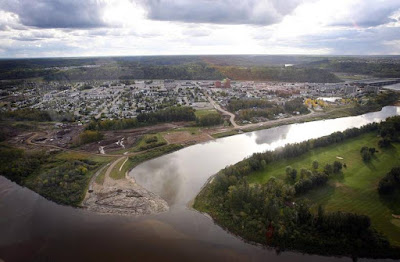Fire!
It's something that most of us learn as children, that when you hear someone scream that word there's only one thing to do...run. This was never so clear as
hearing the voices of people caught in the Alberta Canada fire at Fort McMurray. Captured by Canada's
Day Six, you can hear the desperation of people just being happy to escape the flames, some of them 30 feet high and right at the back door of their houses (many of the homes border the surrounding forest). One man talks of having time to only grab his cat and his pillow, another of losing a $30,000 comic-book collection his mother had just mailed him a few weeks ago (from his childhood). And now that the fire is slowly diminishing, the blaming is beginning, everything from a warming climate to building so close to a fragile boreal forest (an excellent story about boreal forests in general appeared in
The NY Times) to the roads built for logging trucks. But to the many left homeless (to be fair and without even trying to take anything away from the damage done, 85% of the buildings in Fort McMurray are reportedly still intact and suffered only smoke damage), without even a trace of papers or furniture left to dig through, none of that matters; it is a time to start over, to build a life from scratch, refugees in their own land. The fire continues, now at 229,000 hectares (about 560,000 acres), but most human life is out of danger. This doesn't take into account the animal life and even the life of the forest itself.
There have been fires before, many proving
more devastating and covering much more land; from the Amazon to Australia, and from Russia to the U.S., fires have been with us throughout history. And the news reportage, particularly from the UK's
Globe and Mail (which has interactive maps of the fire's spread as well as satellite before-and-after photos), has been penetrating. Imagine being out of your home --out of
a home-- and now digging through donated clothes and waiting for a simple donated meal (each resident affected will receive 1250 Canadian dollars, and each dependent will receive an additional 500 Canadian dollars...that's it). Your home, your car, likely your job, all now gone. And who would have thought...wouldn't we all just want to settle down into a nice town near a river (indeed, many have). Blocks away from any threats, residents must have casually listened as the occasional fire truck sirened by to put out a small house fire; what on earth could possibly change? But nature is not only unpredictable, but fast, striking without warning and often as quickly as a lightning flash. And suddenly what seemed a distant threat is something now just outside your door...at that point, just getting out becomes the priority, saving your children and your animals, never mind your possessions. The heat, the smoke, the ash blinding your way. It could be a volcano erupting, or it could be fire in your kitchen. It doesn't matter at that point. You hear or smell or feel the fire and that word comes back to you...get out. Run!
There will always be those (such as myself) who can sit back and try to (unsuccessfully) relate. A critic of sorts, thinking of what could have been different, what happens to the life in the forest, what have we missed to not let this happen again? Indeed, professionals in the field now and throughout history, professionals in the field of studying fire, are likely still scratching their heads at balancing our quest for a peaceful life surrounded by trees (and building homes nearby) coupled with the risk and effort of saving those homes and lives when fire strikes. But again, to the residents now left with little more than their stories and their lives (so far, no lives have been lost in this recent Canadian fire), absolutely none of that matters. Data and reporting and analyzing charts mean nothing to them for tomorrow is another day with basically nothing left of their past. And rather than reading my meek and minor words, it is better to hear the voices, voices which could have been mine or yours or your family's...they each heard the word --FIRE-- and miraculously got out. But, now what? The
Globe and Mail wrote about these ways you can help:
- Money: Click here to donate to the Red Cross. You can also donate $5 by texting “REDCROSS” to 30333. The Alberta and federal governments have said they’ll match private donations to the Red Cross.
- Supplies: Here’s a crowdsourced Facebook page to connect Fort McMurray residents needing items with volunteers providing them.
- Shelter: Airbnb has waived its service fees for those affected by the disaster. Here’s where you can check in to offer or seek accommodation.
- Volunteers: Those interested in volunteering through the regional municipality can apply here.
To listen to those voices, go to the
Podcast on DaySix (it'll give you chills). And with a picture being more than a thousand words, I'll let some photos give you a glimpse of what was and now is reality for many of those just beginning once again (a thanks to so many of the brave reporters and photographers capturing the emotional and physical devastation of this ever-expanding fire).
 |
| The town in 2011; photo: Jeff McIntosh/The Canadian Press |
 |
| The fire six days ago; photo: Chris Schwarz/Government of Alberta/EPA |
 |
| The fire three days ago; photo: Jonathan Hayward /The Canadian Press VIA AP
|
 |
| Area where the fire passed; photo: Tyler Hicks/The New York Times |







Comments
Post a Comment
What do YOU think? Good, bad or indifferent, this blog is happy to hear your thoughts...criticisms, corrections and suggestions always welcome.